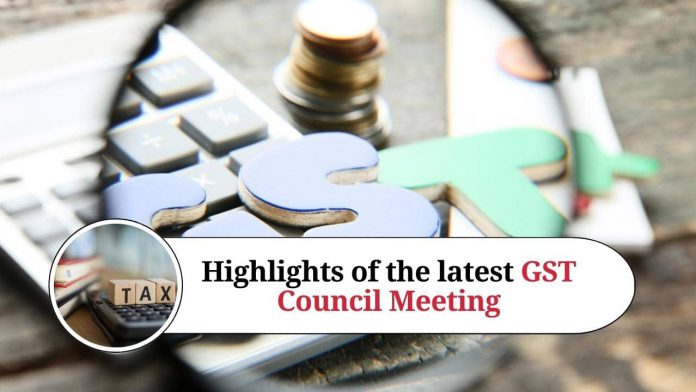Introduction:
The GST Council, which is chaired by the Union Finance Minister and consists of representatives from all states and Union Territories, recently held a meeting to discuss various issues related to GST. Here are the key highlights of the meeting:
- GST rates revised for certain items. The Council decided to reduce GST rates for certain items, including COVID-19 medicines and equipment, from 12% to 5%. It also reduced the tax rate for solar power plants from 5% to 1.5%.
- Threshold limit for registration increased The threshold limit for GST registration for businesses was increased from Rs. 20 lakhs to Rs. 40 lakhs, which means small businesses with an annual turnover of up to Rs. 40 lakhs will not have to register for GST.
- Late fee waiver for small taxpayers Small taxpayers with an annual turnover of up to Rs. 2 crores will get a waiver of late fees for delayed filing of GST returns for the months of May 2021 to July 2021.
- Extension of the deadline for filing annual returns The deadline for filing annual GST returns for the financial year 2020–21 was extended by two months, from February 28 to April 30.
- Measures to curb GST evasion The Council decided to introduce several measures to curb GST evasion, including the use of artificial intelligence and data analytics to track high-risk taxpayers and fraudulent refund claims.
Some additional information about the recent GST Council meeting:
- GST rates revised for certain items: The GST Council’s decision to reduce the GST rates on COVID-19-related items from 12% to 5% was widely welcomed as it will make them more affordable and accessible for people. The items that will benefit from this rate cut include medical-grade oxygen, ventilators, pulse oximeters, COVID testing kits, and hand sanitizers. The Council also decided to reduce the tax rate for solar power plants from 5% to 1.5%, which is expected to give a boost to the renewable energy sector in the country.
- Threshold limit for registration increased: The GST Council’s decision to increase the threshold limit for GST registration from Rs. 20 lakhs to Rs. 40 lakhs will benefit small businesses that were struggling to comply with GST regulations. This move is expected to reduce the compliance burden on small businesses and make it easier for them to operate without worrying about GST registration requirements.
- Late fee waiver for small taxpayers: The GST Council’s decision to provide a late fee waiver for small taxpayers with an annual turnover of up to Rs. 2 crores is a relief for businesses that were facing financial difficulties due to the COVID-19 pandemic. This waiver will help these businesses save money and avoid penalties for delayed filing of GST returns.
- Extension of deadline for filing annual returns: The GST Council’s decision to extend the deadline for filing annual GST returns for the financial year 2020–21 by two months will give businesses more time to prepare their returns and comply with GST regulations. This move is expected to reduce the compliance burden on businesses and ensure that they have sufficient time to file their returns accurately.
- Measures to curb GST evasion: The GST Council’s decision to introduce several measures to curb GST evasion, including the use of artificial intelligence and data analytics, is a positive step towards ensuring that GST revenues are collected efficiently and without any leakage. These measures are expected to help the government track high-risk taxpayers and fraudulent refund claims and reduce instances of tax evasion.
Overall, the recent GST Council meeting made several significant decisions that will benefit businesses and taxpayers in the country. The rate cuts, late fee waivers, and extension of the deadline for filing annual returns will provide much-needed relief to businesses, while the measures to curb GST evasion will ensure that the government collects GST revenues efficiently and without any leakage.
Conclusion:
The latest GST Council meeting made several important decisions, including rate revisions for certain items, an increase in the threshold limit for GST registration, and measures to curb GST evasion. These decisions will have a significant impact on businesses and taxpayers across the country.
Read more useful content:
Frequently Asked Questions (FAQs)
Q.1 What is the GST Council, and what is its role?
Answer: The GST Council is a constitutional body that is responsible for making recommendations on issues related to the GST, such as tax rates, exemptions, and procedural changes. The Council is chaired by the Union Finance Minister and consists of representatives from all states and Union Territories.
Q.2 What were the key decisions taken at the recent GST Council meeting?
Answer: The key decisions taken at the recent GST Council meeting include reducing the GST rates for COVID-19-related items from 12% to 5%, increasing the threshold limit for GST registration from Rs. 20 lakhs to Rs. 40 lakhs, providing a late fee waiver for small taxpayers, extending the deadline for filing annual GST returns, and introducing measures to curb GST evasion.
Q.3 Which items will benefit from the reduced GST rates?
Answer: The items that will benefit from the reduced GST rates include medical-grade oxygen, ventilators, pulse oximeters, COVID testing kits, and hand sanitizers.
Q.4 How will the increase in the threshold limit for GST registration benefit small businesses?
Answer: The increase in the threshold limit for GST registration from Rs. 20 lakhs to Rs. 40 lakhs will benefit small businesses that were struggling to comply with GST regulations. These businesses will no longer be required to register for GST if their annual turnover is less than Rs. 40 lakhs, which will reduce their compliance burden and make it easier for them to operate.
Q.5 When is the deadline for filing annual GST returns for the financial year 2020–21?
Answer: The deadline for filing annual GST returns for the financial year 2020–21 has been extended by two months, from February 28 to April 30.




















